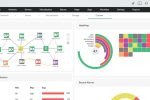TJ Chandler – Managing Director, APAC, Fivetran
As the world cautiously emerges from a recession, companies have begun to cut costs, reduce risk, and accelerate the move to cloud technologies. Among other things, the economic downturn has highlighted the criticality of data as a strategic asset. From decision-making and competitive differentiation to embedding data products for added customer value, knowing what data you have and leveraging it for maximum impact is more imperative than ever before.
Here are three things tech executives must do when managing data for their organisations to survive–and thrive–in the current global economic and public health crises.
Gather Your Best Data
When an organisation inventories its data, it will likely find that it has quite a bit of data that it doesn’t need while simultaneously uncovering a trove of data from which it is not getting the most value.
The key right now is to double-down on the data that is accurate, relevant, and timely — the “a.r.t. of data” — and deprioritise data that lacks any one or more of these three attributes.
For example, would you rather have current sentiment data from your top prospects and customers or last quarter’s P&L sheet? If you need to make real-time decisions you picked the former, which leads me to my next point: You might find that some of your most valuable data is ephemeral, which can be unnerving for those who are traditionally tied to persistent data. Focus on accuracy, relevance and timeliness–even if it makes you uncomfortable, and especially if it challenges your traditional assumptions!
Centralize Data in the Cloud
Cloud readiness is advancing in the region, but the pace of progress is stalling. No new “Cloud First” policies have been launched or implemented in Asia Pacific, and no major cloud-related frameworks have been announced or adopted. This is not a positive sign, as it indicates some countries may have chosen to plateau their technology and infrastructural investment in a time when it is needed the most to recover from the economic fallout from COVID-19.
Such measures are recognised as a key differentiator for digital economies looking to harness the broader technological advancements that cloud computing enables. Emerging APAC markets risk losing out on economic recovery from COVID-19 by not leveraging promising “leapfrog” technologies.
Simply put, if organisations don’t centralise their “best” data in a cloud data warehouse now, they will soon find themselves in an increasingly expensive and impossible-to-manage morass–which will ultimately render all of their data unusable.
Just as servers and applications before them, data warehouses and data lakes are migrating to the cloud for the same reasons: cost, risk and agility. Moving your data to the cloud is inevitable, so make the move sooner rather than later.
Add Data to Your Product or Service
In an economic downturn, it is especially important to find new and innovative ways to make your product or service essential. Adding value by embedding statistics, indicators or analytics into the user experience opens up all kinds of new revenue opportunities, including advertising, cross-sell and up-sell options, as well as freemium-to-premium pathways.
The one requirement? Organizations need to have their best data readily available in the cloud.
Using data as content to repurpose or to resell as new offerings to an organization’s existing base and into new markets is another incremental revenue opportunity that can transform business. For example, I recently worked with a freight company that had strong data assets to optimize operations and predict mechanical failures. The company developed an app using this knowledge and now sells that app to its competitors. By sharing knowledge gleaned from data that no other company has or is willing to share, organizations can make their products and services more valuable and more essential.
The bottom line is that investing in your data strategy during an economic downturn, while counter-intuitive, is actually the best way to survive and thrive in uncertain times. It just might transform your entire business for the better.




















